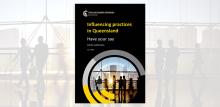The Crime and Corruption Commission (CCC) has today released a publication summarising insights from its examination of influencing practices in Queensland’s public sector.
The publication, Influence and transparency in Queensland’s public sector: minimising the corruption risks associated with improper influence on government decisions, highlights areas of continuing risk and opportunities for reform to improve confidence and transparency across both state and local government.
The CCC’s examination found Queensland’s regulatory framework for lobbying is already one of the strongest in Australia, and will be further strengthened by the adoption of recommendations from recent reviews, such as the Coaldrake and Yearbury reviews, together with legislative and policy reforms announced by the Queensland Government. However, the CCC’s work identified a number of areas of ongoing vulnerability to improper influence and associated corruption risks in the state’s public sector.
To address these gaps, the CCC proposes the following seven reforms to further strengthen Queensland’s integrity and accountability framework:
- Amend definitions to capture all types of influence
- Ensure greater visibility of influence at state and local government level
- Introduce better controls over the influence of former government or Opposition representatives
- Audit compliance with post-separation restrictions
- Introduce a dual reporting platform
- Manage the risks associated with government board appointments
- Deliver education about transparency requirements and how to prevent improper influence.
A number of risk scenarios and why the related reforms are being proposed by the CCC are outlined in more detail in the publication.
The CCC’s work has been informed by the views and concerns expressed by members of the public through complaints and in 54 written submissions, as well as insights from the CCC’s information holdings and analysis of the results of its corruption investigations. The CCC also sought the views of relevant agencies and those responsible for progressing existing recommendations and reforms.
CCC Chairperson Bruce Barbour said that the proposed reforms align with best practice in other jurisdictions and would help to improve public trust and confidence that government decisions are free from improper influence.
“The public expects government decisions to be made in the best interests of the community, and that their state and local governments will be open to ideas and advocacy that can enhance the quality of those decisions,” Mr Barbour said.
“For all views to be properly considered, access to decision-makers must be equitable and transparent.”
In publishing the outcomes of its examination of these issues, the CCC is also seeking to raise awareness across the public sector of what could be considered “improper” attempts to influence decision-making.
“While advocacy to government is a legitimate and necessary part of modern democracies, some practices used to influence government decisions may carry inherent corruption risks. Public sector decision-makers must ensure they are appropriately informed about such practices and know what action to take to prevent or report it,” Mr Barbour said.
“The CCC encourages all public sector employees, elected representatives and individuals who engage with the public sector to read this publication.”
Influence and transparency in Queensland’s public sector: minimising the corruption risks associated with improper influence on government decisions can be accessed via the CCC’s website.

